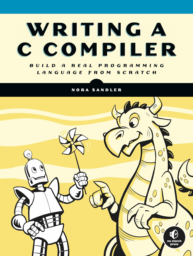

Writing a C Compiler, Part 1 (2017)
by Nora Sandler


Before you start, you need to decide on two things: what language to write your compiler in, and how to handle parsing and lexing. You can implement the compiler in whatever language you like, but I'd recommend using a language with sum types and pattern matching, like OCaml, Haskell, or Rust. It will be SO MUCH EASIER to build and traverse an AST if you do. I started writing nqcc in Python, which I know very well, then got fed up and switched to OCaml, which I didn't know well at all, and it was definitely worth it.🏁
Global Leaderboard
| # | Player | Time | Duration | Accuracy | WPM | pp | |
|---|---|---|---|---|---|---|---|
| 1 | |||||||
| 2 | |||||||
| 3 | |||||||
| 4 | |||||||
| 5 | |||||||
| 6 | |||||||
| 7 | |||||||
| 8 | |||||||
| 9 | |||||||
| 10 |


Before you start, you need to decide on two things: what language to write your compiler in, and how to handle parsing and lexing. You can implement the compiler in whatever language you like, but I'd recommend using a language with sum types and pattern matching, like OCaml, Haskell, or Rust. It will be SO MUCH EASIER to build and traverse an AST if you do. I started writing nqcc in Python, which I know very well, then got fed up and switched to OCaml, which I didn't know well at all, and it was definitely worth it.🏁